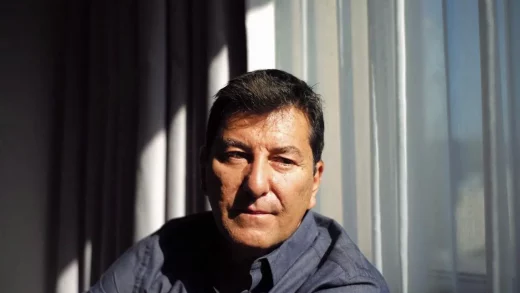:format(webp)/https://www.thestar.com/content/dam/thestar/entertainment/stage/2023/06/01/guillaume-ct-robert-lepage-reimagine-groundbreaking-multi-media-ballet-frame-by-frame/bertinshaw_james_and_ogden_in_frame_by_frame.jpg)
Almost exactly five years to the day and on the cusp of the National Ballet of Canada’s new, improved revival of “Frame by Frame,” principal dancer and choreographic associate Guillaume Côté still vividly recalls the world premiere of his groundbreaking collaboration with Canadian theatre maverick Robert Lepage.
Billed as an homage to the Oscar-winning Scottish-Canadian experimental filmmaker Norman McLaren, “Frame by Frame” was the keenly awaited culmination of years of research, workshops and rehearsal. Côté and Lepage sat together in the audience.
“I was very fidgety,” said Côté. “Robert turned to me and asked, ‘Are you nervous?’ ‘Of course,’ I replied. ‘I want it to be good,’ to which Robert coolly responded, ‘Well, we don’t even know what it is yet.’”
As with any ambitious new production — and “Frame by Frame” is arguably the National Ballet’s most ambitious to date — its creators can never be sure exactly what they’ve made until it is performed before a live audience.
On that score, Côté and Lepage should have been overjoyed because, in 2018, the audience response to “Frame by Frame,” with its mashing of dance, storytelling, film and hi-tech visual effects, was wildly enthusiastic. The reviews — even the New York Times weighed in — ranged from qualified praise to over-the-top encomiums. Most importantly for the National Ballet, the show sold lots of tickets. The magnetic Lepage factor also attracted people beyond the regular dance crowd.
While the ballet’s allusions to McLaren’s same-sex relationship with lifetime companion and colleague Guy Glover might not get Ron DeSantis’s imprimatur in Florida, Lepage describes it as a “family show” in that there is never a dull moment. It’s quirky, full of action, visually riveting and often quite funny.
As ballets go, “Frame by Frame” is appropriately cinematic in structure. It originally comprised 22 vignettes, some of which provided an outline of McLaren’s journey from the Glasgow School of Art to Canada’s National Film Board where, from 1941, he began establishing its first dedicated animation studio. McLaren and his team, in a predigital analogue age, often working hands on with film stock, etching and painting frame by frame, built an international reputation.
Several scenes brought some of McLaren’s most celebrated films to life on stage: the Oscar-winning pixillation short “Neighbours” (1952), the black-lit “A Chairy Tale” (1957) and, perhaps most famously, his influential ballet film “Pas de deux” (1968). Others were more abstract and impressionistic with Côté’s choreography riffing playfully off McLaren’s most boundary-pushing experiments.
The problem was that Lepage, who directed the show, and Côté ended up with too much stuff.
“We had wanted to be faithful to the subject matter,” said Lepage, “but had not had enough time to reflect. We knew it would need revision.”
Added Côté: “We weren’t fooling ourselves that we were going to make something incredibly coherent right from the get-go. We did not see all the vignettes back to back in sequence until opening night. It felt very driven by the passion and by the style and creativity of McLaren as we explored many different facets, including his personal life.”
For Côté and Lepage it was clear there were too many scenes, some indispensable and others possibly not. At 132 minutes with no intermission it was also a lengthy haul for audiences. “Frame by Frame” needed a rethink.
The way big ballet companies operate, that’s easier said than done. They run to carefully planned timetables often mapped out several years in advance. Allowance for making substantial changes to new work is rarely pencilled in. Fortunately, then artistic director Karen Kain who, according to Lepage, had long been angling for him to work with the National Ballet, agreed to commit the time and resources required to stage a revised production. Then the pandemic hit, accompanied by a change of artistic direction from Kain to Hope Muir.
“I was thrilled that Hope agreed to honour Karen’s commitment,” said Côté.
And why wouldn’t she? “Frame by Frame” had created so much buzz that London’s leading dance house, Sadler’s Wells, has stepped in as a co-producer, offering the National Ballet the chance to present the work in England. Sadly the pandemic scuttled that plan.
Still, with the prospect of a remount before them, its co-creators got to work.
For several years outside the National Ballet, Côté and Lepage have been working together on a dance version of “Hamlet,” to be produced by the choreographer’s own company, Côté Danse. A “first draft,” as they call it, will be shown in late July at the summertime Festival des Arts de Saint-Sauveur in the Laurentians north of Montreal, where Côté serves as artistic director.
“When we got together for ‘Hamlet’ we usually left a moment to sit down and review and talk about ‘Frame by Frame,’ things that were redundant, not clear or half-baked,” Lepage explained.
As had happened in the lead-up to the ballet’s 2018 premiere, Lepage also invited several of the dancers to attend a workshop at the headquarters of his company, Ex Machina, in Quebec City. It meant that a good deal of the preparatory work for a revised version could be accomplished without cutting into the National Ballet’s busy schedule.
“It was also an opportunity for us to re-explain because you have all these young dancers now who don’t necessarily know anything about McLaren,” said Lepage.
There has been a substantial turnover of dancers at the National Ballet since 2018. Five of the original lead dancers involved have retired or moved on. Fortunately, Jack Bertinshaw, who so incandescently brought Norman McLaren to life in 2018, is still around to reprise the role, but for many of his younger colleagues this will be their first outing with “Frame by Frame.”
Deciding what to cut proved to be a sometimes heart-wrenching task.
“There is the picnic scene which we’ve cut. It had such sentimental value for us because it was like a home movie with Norman and his friend Guy and other National Film Board animators. It was such a precious thing, but sometimes you have to sacrifice your babies,” said Lepage
Remarkably and by their independent accounts, Côté and Lepage accomplished all the necessary chopping without butting heads.
“Never, never, ever,” emphasized Lepage, “because of the complete ignorance on my part and on Guillaume’s part of each other’s craft; complete ignorance and so also complete trust. It is truly a 50/50 collaboration and it happens that we’ve also become very good friends. We have such respect for each other.”
The end result of all the apparently amicable editing is a new version of “Frame by Frame” that now clocks in at 120 minutes of actual performance. A 20-minute intermission has been added.
Lepage and Côté feel strongly that all the work that’s gone into the revision of “Frame by Frame” will pay off in the long term.
“It is so distinct and different,” said Côté. “It’s a glimpse perhaps of a new way of making ballet for today’s audiences.”
Added Lepage: “It is expected to be one of the shows that can represent the National Ballet to the outside. It has so much potential.”
JOIN THE CONVERSATION
does not endorse these opinions.


